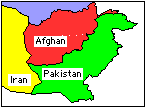|
|
 |
|
|
|
|
|
||
|
|
|
|
|
|
|
|
|
Afghanistan is a multi-ethnic country. Since the king, Zahir Shah, was overthrown by one of his relatives in 1976 the country has become more and more insecure. The new president Daud was overthrown by a small communist group who had mostly been trained in the Soviet Union and controlled some of the key positions in the armed forces and police. They formed a regime with communist aims and at once called on Russian help to maintain them in power. Russian invasion The Soviet defeat in Afghanistan may have been the trigger for the subsequent collapse of the Communist system in the Soviet Union and eastern Europe. In Afghanistan the Russians left behind a Communist government which they continued to support though it controlled only part of the country. The Communist government surrendered in May 1992. Fanatics Afghans say that the fanatics are in fact supported by the regimes in Iran, Pakistan and Saudi Arabia and do not represent the normal sentiment of Afghans. It may be that they actually represent a new attempt by foreigners to control the country. Taliban By 1999 they had conquered the largest part of the country and declared themselves the government. They were not recognised by the UN and major powers and never gained control of the whole country. Only Pakistan, Saudi Arabia and the United Arab Emirates recognised this regime. Usama bin Laden, a member of a wealthy construction family in Saudi Arabia (of Yemeni origin) was associated with the Taliban, who were also assisted by Pakistan. (He was described by the leaders of the Taliban as a 'guest' and probably contributed money to them). After he was expelled from Sudan for organising terrorism against the United States he came to live in Afghanistan, from where he seems to have organised more terrorism, including an earlier attempt against the World Trade Center in New York, and an attack against a US warship in the harbor at Aden in the Yemen and probably also the destruction of the US embassies in Kenya and Tanzania with car bombs. In an attempt to get him expelled, the US (when William Clinton was president) bombarded parts of the country with cruise missiles. However, this had no effect as the Taliban regime was dependent on him. In September 2001 an attack by aircraft hijackers, probably organised by Osama's associates named Al Qaeda by the western authorities, on the New York World Trade Center, the tallest office building in New York and also the US military headquarters in Washington, the Pentagon, provoked a war with the United States. US forces assisted the main opponents of the Taliban, the Northern Alliance (formerly led by the assassinated Ahmed Shah Masood) to overthrow the Taliban government. A new government was installed (see main Afghanistan article) This new government seems to have little influence over what happens in the country.There continue to be wars between the military leaders of different areas. US and other western troops from NATO are based in the country, searching for Taliban leaders, without much success. Military forces from NATO operate in the country, but rather ineffectively. The Taliban continue to control some areas of the country and act as a guerrilla force against the western troops (and Afghan supporters of the government). Reports from NATO commanders suggest that the western forces and the official Afghan government are losing ground to the Taliban, who see themselves as a Resistance. This problem is clearly one of the most urgent for the new president, Obama, in the US to tackle. He announced within two weeks of taking office that he would send more US troops and asked for more support from European states - but they probably will not send any. The history of Afghanistan - three wars against British invaders - suggests that no victory is possible and that the war will go on indefinitely. One problem is War Aims. What is the real aim of this fighting? How could it be decided that the aims had been reached and the troops could be withdrawn? For example:
Tajikistan Pakistan |
Sandy Gall - War against the Taliban Junior Officers' Reading Club - Patrick Hennessey Junior Officers' Reading Club An account of a British army officer in Afghanistan Jason Elliot - An Unexpected Light An account of travelling just before the Taliban seized power. Idries Shah-Kara Kush A novelised account of the war against the Soviet forces. Comment by William Dalrymple Sherard Cowper-Coles - Cables from Kabul Rajiv Chandrasekaran - Little America Little America: The War Within the War for Afghanistan Review by Julian Borger |
